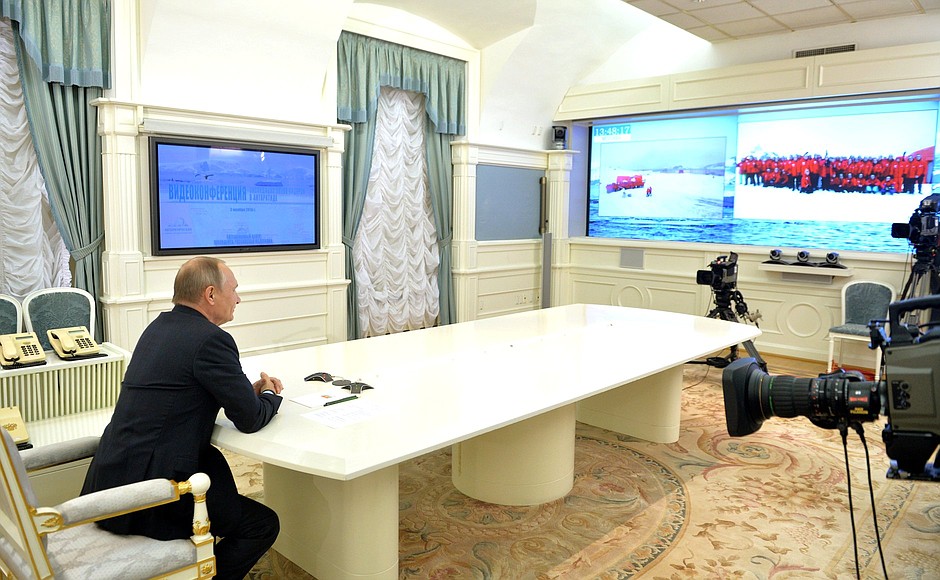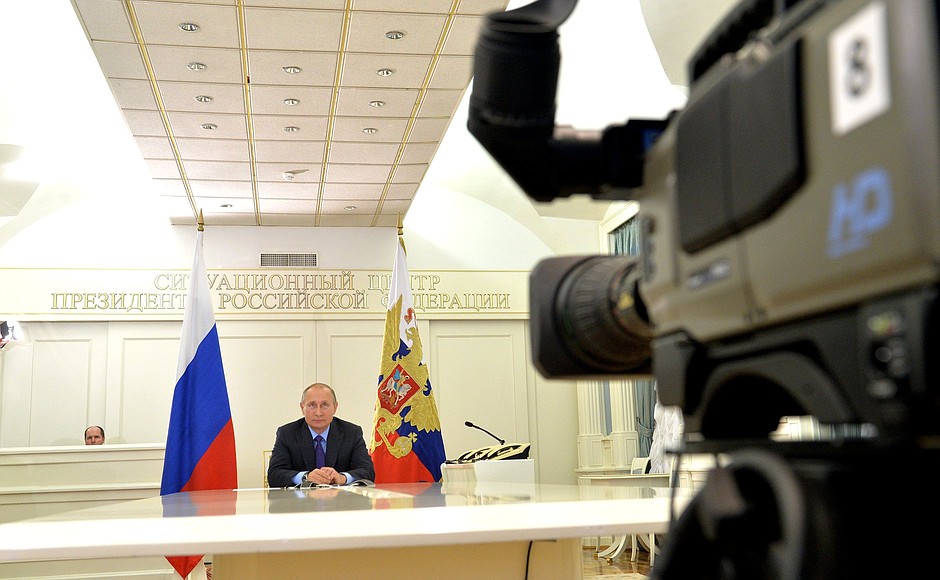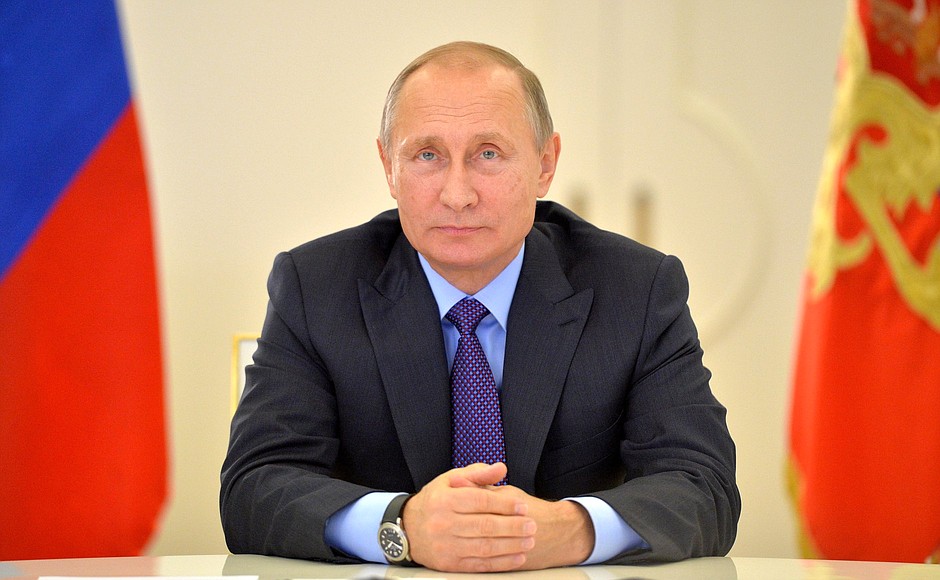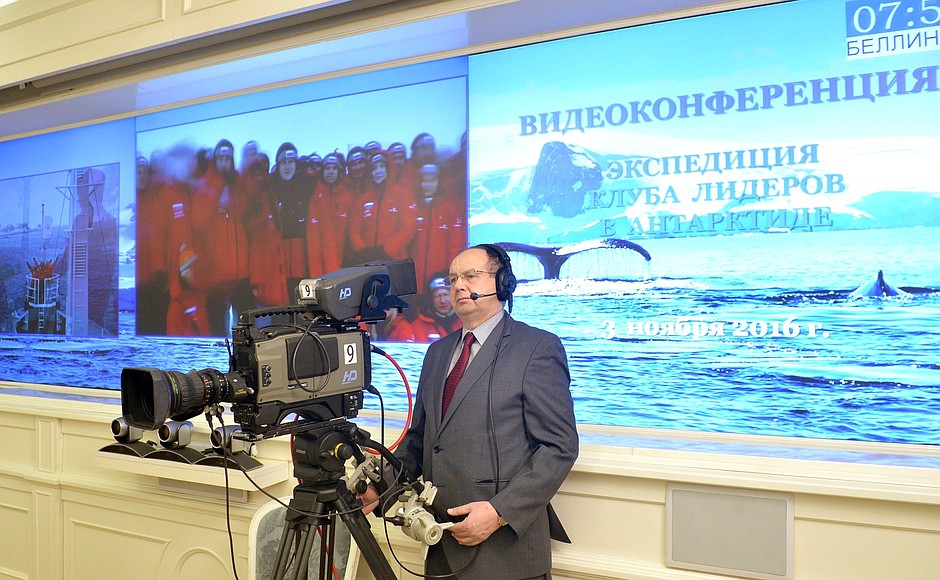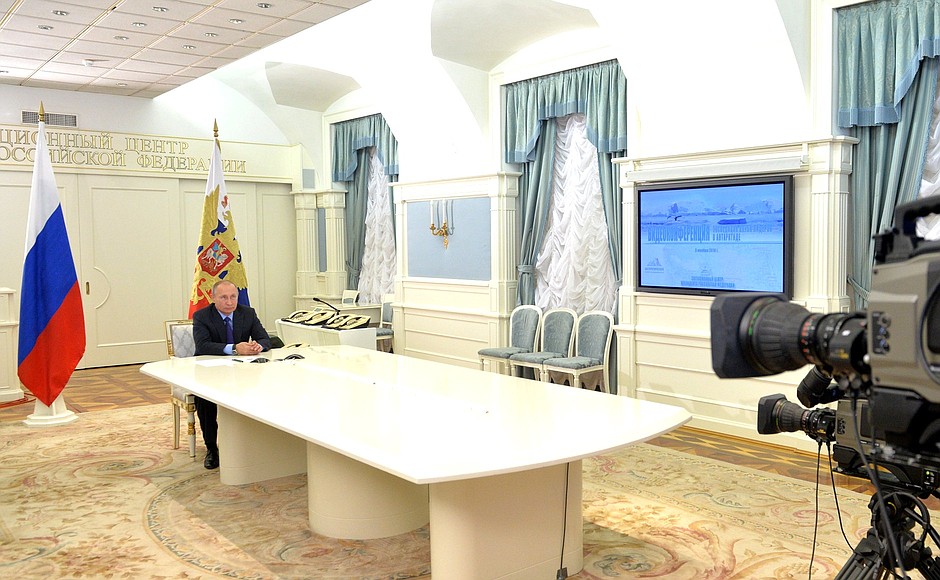Vladimir Putin spoke via video linkup with members of the Leaders Club expedition currently in Antarctica.
* * *
President of Russia Vladimir Putin: Hello!
Response: The Leaders Club expedition greets you from Antarctica once again, this time from the Russian station Bellingshausen.
Vladimir Putin: Nearly two years have passed since the Leaders Club made its first expedition to Antarctica. That was more of an expedition to simply get familiar with the place, though, as far as I recall and you told me, you carried out some medical experiments and tested Russian-made goods — video and radio communication equipment.
This was already a good result. Today, as far as I know, you have people with you who are ready to take part in exploring this continent. I know that you have ideas for supporting our scientists, especially young scientists and all specialists engaged in research in these promising areas. Antarctica certainly offers promising research opportunities because work there can help us to deepen our knowledge of our planet in general.
Let us not forget either that 80 percent of the Earth’s entire fresh water is concentrated in the glaciers there. In short, there is plenty to work on, and Russia’s presence in Antarctica is very important. It is also important that you have put forth the initiative of declaring one of the upcoming years a Year of Antarctica. This will certainly raise interest in studying this continent and in our research there.
I would like to hear from you today how things are going, how you feel, and how your work is progressing, especially since, as far as I know, your travels and expedition are set to continue.
Response: Thank you, Mr President.
Interest in Antarctica is growing among businesspeople. Our first expedition brought 15 entrepreneurs out here, but now we have 100 small and medium business representatives.
We came here not only because Antarctica attracts – and it really does have a pull – but because we want to support Russia’s presence in Antarctica and remind our people about Russia’s Antarctic pioneers, our officers and sailors.
We have been here at Bellingshausen for two days now. Talking with our polar specialists, we have understood what kind of contribution Russian business can make to research. Here with me are entrepreneurs Alexei Martynov and Alexei Pakulin. They were with me on the first expedition. They already have some concrete results. If you permit, I would like to give them the floor.
Vladimir Putin: With pleasure, go ahead.
Alexei Martynov: Good afternoon Mr President. We are working on new developments in healthcare.
We were in Antarctica, at Mount Vinson, two years ago. The expedition members encountered problems with the way the body behaves in extreme conditions. As we discovered, the body is not prepared for extreme conditions and minor issues can turn into major problems. Antarctica has a very difficult climate with very low humidity, low temperatures, and strong winds.
On our return from the expedition, we got in contact with our partners at research centres such as the Federal Agency for Medicine and Biology and the Moscow Institute for Physics and Technology and worked out what developments and technology we have here in Russia that could be used by polar specialists and people doing research, and whether commercial production of these goods could be organised.
We have brought with us the first device, which looks like a watch and is designed to compensate for the lack of natural solar light. This is very important for polar researchers during the long polar night, and could also have use in our country, which has quite a few cities that do not get sufficient natural light.
The next product came in very useful during the previous expedition. It is designed to cut off any blood flows in an emergency, because blood loses its natural coagulating ability in these conditions, and in very low temperatures, you need to use materials that help to stem the flow. We developed and brought such products here.
These items, and the tent that you see behind us, are entirely Russian-made, made from modern Russian-made materials. The tent can be set up and taken down very quickly and can be used in extreme conditions and during research. We are going to hand all this over to the polar specialists for study.
As always, we are testing communications equipment too. This time, we have brought with us a unique Russian-designed satellite antenna that we are now testing in action. It seems that it is working well.
Alexei Pakulin: Good afternoon. The last expedition showed that our polar researchers badly need specialised transport. Many of the vehicles that exist today are produced in other countries.
We have some developments of our own and have conducted tests. Within the next 6 months, we will be ready to present a Russian-made vehicle designed especially for polar conditions, and it will join the developments of our entrepreneurs and institutes, that have already made significant progress in this area.
I am sure that in two years’ time, our polar research stations will have Russian-made vehicles. What is more, other stations here have also shown interest in our designs. Thank you very much.
Vyacheslav Traktovenko: Mr President, good afternoon, my name is Vyacheslav Traktovenko and I am a businessman from Baltros Group in St Petersburg.
We proposed our initiative at one of the meetings of the Leaders Club St Petersburg branch, where we discussed this expedition and how we could provide real help to Russia’s presence in Antarctica. One of our proposals was to establish a business community grant for supporting young researchers, our scientists. We are ready to provide complete financing and support for our research institutes’ activity in Antarctica. This will enable young scientists and other researchers to travel to Antarctica to pursue their research.
The Leaders Club is also ready to pay for organising the selection of these young scientists. We will organise the tender and arrange travel of the five winners to Antarctica by the end of this season, so that they can start their research at the Russian bases here.
If this brings results for our polar researchers and for the business community, we would be ready to organise a national tender, involving other small and medium businesses with an interest.
Igor Yesin: Mr President, during the journey here, we watched several films about Antarctica, its exploration, and how much effort our polar specialists have put into developing the stations and the infrastructure here.
We know that several stations were abandoned and practically closed down during the 1990s, including the station Russkaya, which has a unique location. Together with our colleagues in the Leaders Club, we propose financing and restoring any of these stations and, in this way, continuing Russia’s tradition of patrons-entrepreneurs.
Meri Nazari: I greet you from the sixth continent. This really is an exceptionally beautiful place with grand and magnificent, pristine nature.
As an entrepreneur and director of the Pioneer cinema network, I would like to make a contribution to culture and to Antarctica’s development, of course, and I think that we could organise a festival of films about Antarctica to mark the 200th anniversary of the feats of explorers Bellingshausen and Lazarev (and then make it a regular event).
Many films celebrating the feats of Russia’s polar explorers were made during the 1960s-1980s. They had wonderful actors and excellent soundtracks, but, sadly, they are not often shown now. I am sure though that such a festival would attract many people all around Russia, and most importantly, it would bring to the cinema people who hardly ever go there now. I think it is also very important to make a new film about extraordinary and very brave people in time for the 200th anniversary in 2020. They gave us Antarctica, and the Russian presence is very strongly felt here.
Thank you and I hope that we will make this project reality not only through the efforts of the pioneers, but our entire cultural community.
Response: Mr President, these are not all of the ideas we have. Each of us has proposals, and there are still another 5 days of productive expedition ahead, where I am sure we will have more interesting proposals. If you permit, we would like to systematise our proposals and present them to you when we get back to Moscow.
Vladimir Putin: Thank you very much.
From what you said, I understood that this is not a full list of the things you have planned. It is already clear that we will continue research in Antarctica, particularly with your help. We will use the equipment you develop, and our researchers will be able to count on modern Russian-made medicines and medical equipment, travel in Russian-made buses and special vehicles, attract young researchers and reopen stations and continue research, all with your help as well.
Most important of all, you have another five days ahead and, as you said, you had some problems last time, so I wish you to return home on schedule and without any problems. Good luck and all the very best!
Response: Thank you very much. We congratulate you and all of our fellow citizens on the upcoming National Unity Day.
Vladimir Putin: I congratulate you too. Happy holiday!
